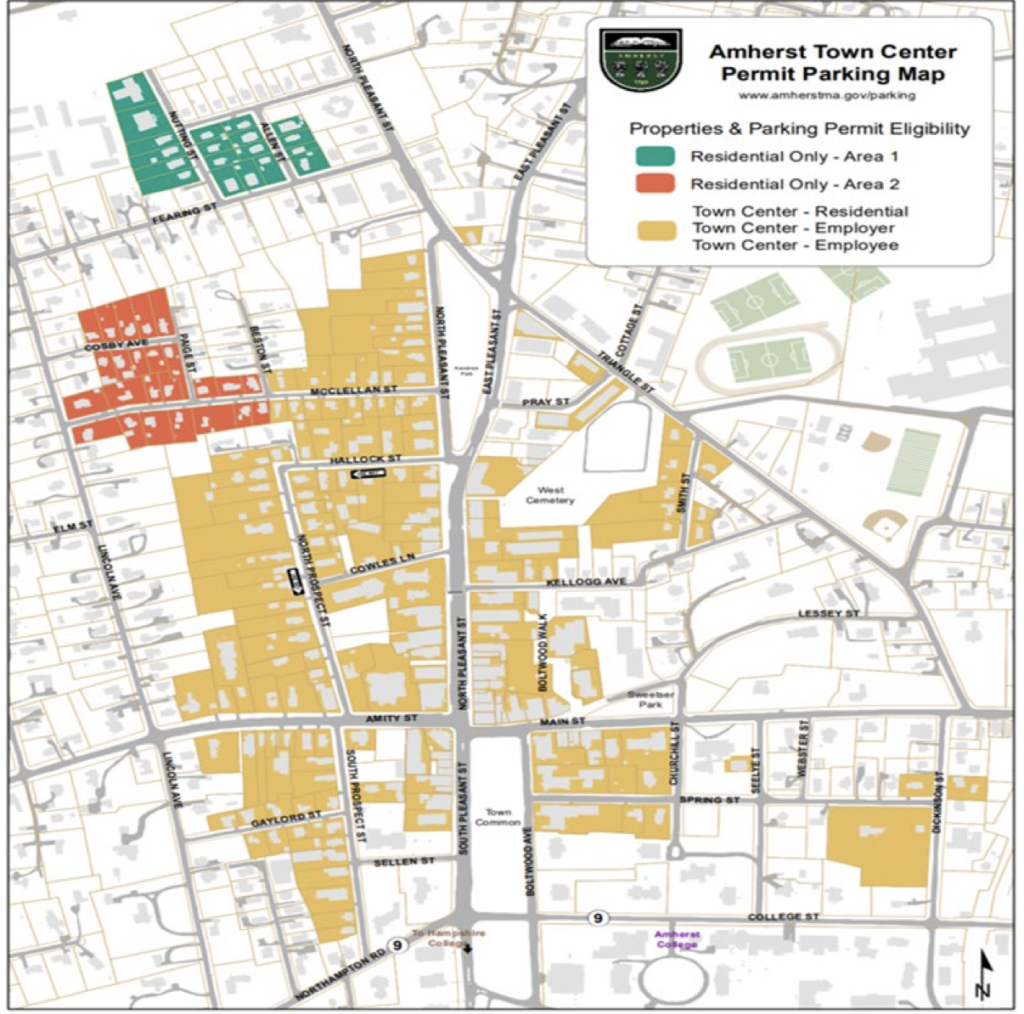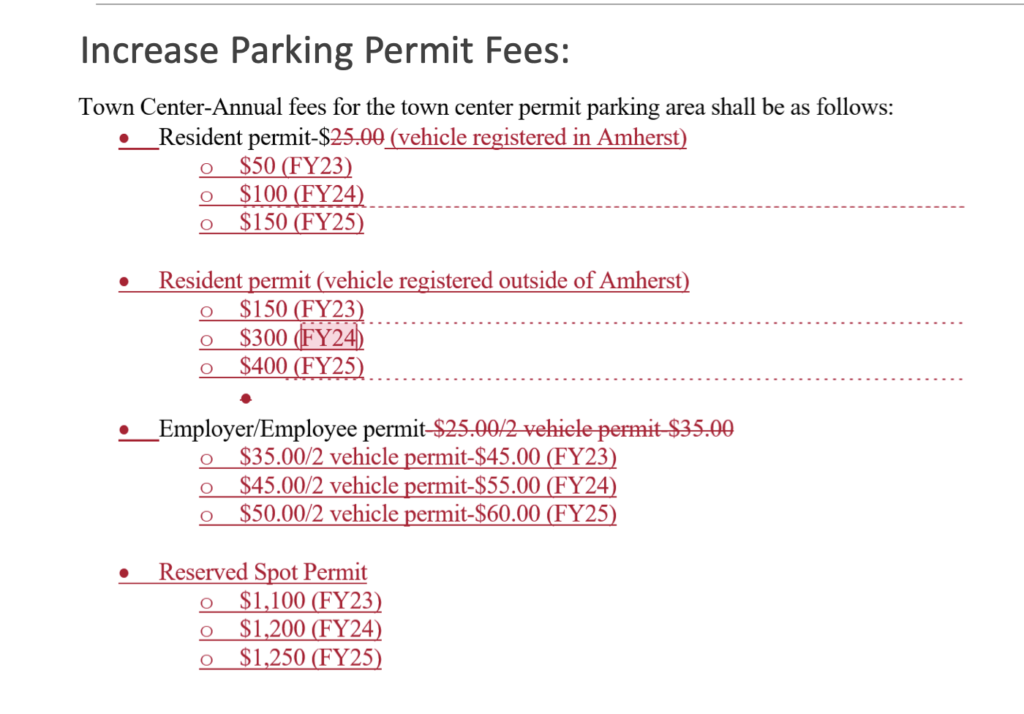TSO Mulls Parking Permit Fee Increases

Photo: amherstma.gov
Report On The Meeting Of The Town Services And Outreach Committee, February 1, 2022
Present
Dorothy Pam (Chair), Shalini Bahl-Milne (District 5), Ana Devlin-Gauthier (District 5), Anika Lopes (District 4) , Andy Steinberg (at large)
Staff: Paul Bockelman (Town Manager), Jennifer La Fountain (Town Collector and Treasurer), Sean Mangano (Finance Director)
The meeting was held over Zoom and was recorded.
Meeting Schedule
The Town Services and Outreach Committee (TSO) will meet on alternate Thursdays 6:30—8:30 p.m. beginning February 17.
Proposals For Changes In Town’s Parking Permit System
The bulk of the meeting was devoted to a presentation by Finance Director Sean Mangano and Treasurer Jennifer LaFountain on proposed changes to the town’s parking permit system. The full presentation can be viewed here. Mangano and LaFountain proposed substantial increases in parking fees to be spread over three years, as well as adding a higher fee for those who do not register their cars in Amherst.
This was the first discussion of this proposal and TSO took no vote on the matter. The proposed changes will now go before the Finance Committee on February 15 and come back to TSO for further deliberation on February 17. TSO will hold a public hearing on changes to the permitting system on March 10 and following that the matter will go to the full town council for deliberation and a vote on adoption.
The town issues four types of parking permits.
- Town Center Permits for town employees and those who live in the downtown business district.
- Resident Only Area 1 (see Map below). Valid only from September 1— May 31.
- Resident Only Area 2 (see Map below). Valid Only from September 1— May 31.
- Reserved permit – lower level of the Boltwood Garage – valid for one year from purchase
Town parking permit fees are currently priced at $25—$35 /year except for the garage,which is $1,000/year.

A total of 548 permits have been issued this year so far. La Fountain estimates that between 15 and 20% of that number is residential.
She and Mangano propose increasing all fees over the next three years as indicated in the following table—with a cost differential for those who register their cars in Amherst and those who do not. Increased parking fees will be used to generate funds for capital improvements that impact downtown such as lighting, signage, additional parking spaces. The fee increases will be introduced over a three-year transition to ease the burden on fee payers. They noted that our current parking fees are not in line with what other communities charge and that there have been no fee increases in at least a decade.

Discussion
Ana Devlin-Gauthier asked what kind of data on parking does the town need and how will they get it?
Mangano responded that they have data on registration status of permit holders but it is not in a format that is easily viewed. He noted that they are considering moving from parking meters to smart meters or kiosks, which would give the town much better data on use and demand for parking.
And if the whole system was on the kiosk, users would be able to use a phone app to track where parking is available. To get the best information, the payment system and the app would need to be a unified system. This concept was part of the Nelson/Nygaard report about parking in Amherst (2019).
Devlin-Gauthier also asked whether we are thinking of access to charging stations for permit holders.?
Paul Bockelman replied that we don’t want chargers in permitted areas because we want people charging to charge and move on.
Devlin-Gauthier asked about the definition of “household,” restrictions on visitor passes per household, charging a higher fee than proposed for spaces in the Boltwood Garage, zand permitting motorcycles.
Steinberg suggested a better term for “household” for situations where owners rent rooms to multiple tenants in a single residence or apartment. Steinberg asked about how the town could solve the problem of owners not providing sufficient parking for their tenants, adding that this can easily be interpreted to mean that the town is enabling developers to construct housing without for their tenants.
Committee members also raised the following issues:
- the time the committee needs to consider the changes before a vote and what the committee is recommending to the Council
- fee increases and the rates being low in relation to comparable area permit rates
- stakeholders and how to solicit input from them (they greed that TSO will send information to stakeholders, the committee will hold the public hearing and hear input from the Finance Committee and the Transportation Advisory Committee, and make a recommendation following deliberation
- handicapped parking regulations
Town Manager Appointment To The Board Of License Commissioners
TSO endorsed unanimously Bockelman’s nomination of Doug Slaughter for a two-year term on the Board of License Commissioners, to expire on June 30, 2024. Slaughter has served previously on that board.
Lunch Carts
TSO discussed delegating authority to approve “lunch carts” in the public way to the Board of License Commissioners.
Public Comment
Tracy Zafian, Amherst resident and chair of the Transportation Advisory Committee (TAC), asked that the committee give the TAC guidelines for review of the permit regulation changes if they would like input, and noted the council voted to eliminate parking on one side of North Pleasant Street in December to accommodate the angled parking at Kendrick Park. She also commented that many sidewalks were not shoveled after the recent snowfall; the SeeClickFix response was that the issue can be handled by the Amherst Police Department (APD) and that resident should contact the APD. APD said that they handle calls about unshoveled walks. Zafian pointed out that it’s not clear whether there is any enforcement. She suggested that there needs to be a system that is easily accessible to residents and pointed out that enforcement of sidewalk maintenance regulations typically falls to inspection services in other towns . She also reported that during snowstorms, some drivers blocked the sidewalks by not pulling deeper into their driveways. She said there should be a way to address this, too.

One of the larger proposed parking permit program changes is the recommendation to change the permits from being in effect for Sept-May each year, to making them year-round, running July-June. Does the parking demand downtown over the summer warrant such a change? In past summers, it seemed to me that many of the permit parking spaces in the residential parts of downtown are under-utilized. One other consideration here, if the downtown parking permits are going to be switched to being year-round (12-months), is whether that 12-month period should start in July, as proposed, or in September so as to better aligned with the yearly parking permits for the UMass parking lots?
I also found it interesting to learn that the expensive 12-month permits for the 24/7 28 reserved spaces in the lower level of the Boltwood garage, do not all have the same start and end dates, but vary based on when the permits are purchased. Could those variable dates be contributing to under-utilization of those spaces? And might quarterly permits — or 12-month permits that all start the same month — make more sense? Some Councilors have also asked that the consideration be given to having some of those permits have more limited hours (such as daytime hours) so that those spaces would be available for public parking at other times. The Nelson-Nygaard downtown parking study made a similar recommendation after finding that those reserved spaces were sometimes underutilized.